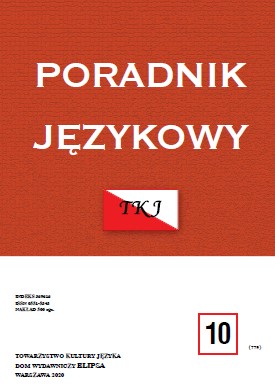GALANTY I GALANCIE JAKO LEKSYKALNE WYKŁADNIKI STOPNIA NATĘŻENIA CECHY W GWARACH I POLSZCZYŹNIE OGÓLNEJ
GALANTY AND GALANCIE AS LEXICAL EXPONENTS OF THE INTENSIFICATION DEGREE OF A CHARACTERISTIC IN DIALECTS AND GENERAL POLISH
Author(s): Irena JarosContributor(s): Monika Czarnecka (Translator)
Subject(s): Theoretical Linguistics, Lexis, Semantics, Western Slavic Languages, Philology
Published by: Dom Wydawniczy ELIPSA
Keywords: lexicology; dialectology; dialects; colloquial Polish language; regionalisms;
Summary/Abstract: The author presents the functions of the lexical exponents of gradations with a dialectal origin, namely of: the adjective galanty and the averbs galancie, galancio, galanto in the colloquial Polish language and Polish dialects. Based on dialectal and general Polish data coming from published works (dictionaries, atlases, dialectal monographs) and unpublished collections of vocabulary, she discusses their gradational meanings falling into three semantic categories: sufficiency (e.g. galancie osób pojechało (‘quite many’ people have gone)), completeness (e.g. zupa galanta (‘quite a good’ soup)), and intensity (e.g. galancie wąski (a ‘very’ narrow)). The identification of the meanings of the discussed forms as exponents of the intensity of a characteristic is, in most cases, conditioned on the context. They express various values of many gradational characteristics which are extracted while being actualised in a sentence. Due to their limited distribution (mainly Greater Poland, Kuyavia, Łęczyce and Sieradz Land, northern Lesser Poland, Masovia, Chełmno and Dobrzyń Land) and presence in the colloquial Polish language, the discussed forms can be classified as regionalisms with a dialectal origin.
Journal: Poradnik Językowy
- Issue Year: 2020
- Issue No: 10
- Page Range: 77-87
- Page Count: 11
- Language: Polish
- Content File-PDF

